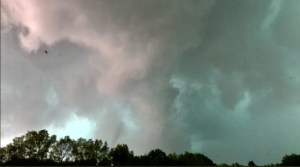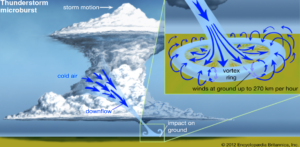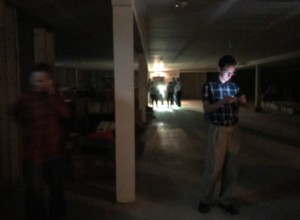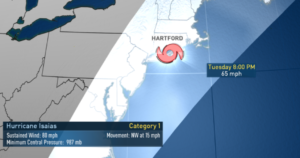This Isn’t Normal: Climate Change from a Reporter’s Perspective
Thick clouds took over the sky as I raced down windy roads, trying to beat the impending storm. Against the strong wind, trees bent uncomfortably close to my small, red car. I zipped around tight corners hoping, more like praying I’d make it to the town hall in one piece. I wasn’t used to driving through the backwoods of Connecticut, but that wouldn’t stop me. I was a rookie newspaper reporter determined to prove myself. I looked to the sky hoping it wouldn’t turn green.

Skies turning green as a tornado approaches- Photo by C. Read
The town hall building came into view as the rainfall began. Huge droplets obscured the road in front of me. I maneuvered carefully, as the roads started to fill with water. Somehow, I managed to pull into the parking lot, but it was too late: The storm was on top of me. Lightning streaked across the sky, followed by crashes of thunder. The winds violently shook my car, making it impossible to run inside.
I was trapped.
I hunkered low onto the floor beneath the steering wheel of my small Nissan Sentra and texted my mom “I love you” as giant trees fell, and flying debris whipped through the air around me. This couldn’t be the end, I thought. I’d just started this job!
The storm was over in less than five minutes. When everything calmed down, I cautiously exited my car, relieved to see it was unscathed. All around me was wreckage. Dismembered tree branches and trunks, and power lines spewed across the road. The wind had sucked the dirt out of the ground and thrown it on the main road, sidewalks, and even the parking lot of the town hall. Not only did I report on a town meeting that night, but also on this storm, which led to one tragic death in the area. A question glared at me: Why were we experiencing this severe, Midwest weather in Connecticut?

Microburst Diagram
Climate change certainly wasn’t at the tip of my tongue that day in 2013. The subject still wasn’t part of any common conversation within the areas I covered for the newspaper. However, the bizarre part of this freak storm that it was only a microburst. Straight line winds, or microburst, are associated with tornado-like conditions since the winds can reach up to 100mph, an equivalent to an EF-1 tornado. I chatted with a few local politicians as cleanup was underway. One first selectman explained with each passing year climate change has become more obvious whether it’s forest fires, storm surges, record number of droughts and more, but it’s on our shores and there is no going back. Yes, we’re a coastal state; But, hurricanes and strong tropical storms shouldn’t be this significant. They shouldn’t reach our shores, bringing such devastation.

Taking shelter in the news office basement.
I never thought twice about the raging weather I saw that day because I simply had adapted to the chaos. Even after such a close encounter with a microburst, I remained relatively oblivious. Sometimes what’s obvious to everyone else isn’t apparent, until someone points it out to you. For almost a decade afterward wild weather continued to plague our state and grew more intense with each passing year. It wasn’t until May 2018 when I’d finally wake up and fully realized how bad it had gotten. Once again, I found myself barricaded against extreme weather, but this time in my office’s basement as we waited out a nearby tornado. Friends on the West Coast frantically texted me inquiring about my safety. The messages that poured in: Everything we are seeing on the news looks so scary. How are you managing all of this?
My newspaper colleagues and I often hide our concern with dark humor and sarcastic jokes. We are in the business of news, so we’re well aware of the grim reality of climate change. In my mind I already knew our planet is toast. I have found, after about a decade within the news field and interviewing various sources, there is no crossing bipartisan lines because people don’t want to try. It’s a constant game of he said versus she said, where nothing gets resolved because it’s just easier to blame another person than come up with a solution. The dark jokes I share with colleagues hide the resentment I harbor against those who have the power to at least try to fix the issue but choose not to. Don’t get me wrong: there are those who genuinely do care about climate change and are trying to implement resolutions that offer me moments of hope. Yet it feels the naysayers are always the loudest. I usually try to push the thought out because I need to stay alert and focused on whatever news pieces come across my lap during the work week. I mainly try to avoid thinking about it to stop the creeping anxiety that comes with it.
Many of the towns we cover are currently trying to do their part by banning plastic bag use, being extra vigilant to their wetlands, and even having town-wide clean up days to encourage recycling. But even their leaders know it won’t make much difference. This destructive weather that takes out trees, buildings, power lines, and even rearranges a state forest isn’t something fewer plastics, vigilance, and more recycling can change. It’s not normal and it gets worse with each passing season.
Vulnerable populations, as usual, pay the price. During the last major storm in August 2020, Tropical Storm Isaias, my grandfather was without power for almost a week, along with thousands of others, because a local power company, Eversource, “underestimated” the storm. They didn’t send any trucks out to remove live power lines, trees that blocked ambulance access to those in distress, or even respond to phone calls from local mayors and politicians desperate for answers.
What if this storm had happened in the dead of winter? What then? My editor was hesitant on me venturing out to cover the storm since the roads were very dangerous, but we both knew people needed to see the sheer destruction Isais caused. As a journalist you try your best not to allow your emotions to influence a story, but I was angry that day and disgusted with this company. They monopolized our state then failed to provide power and I had a lingering suspicion that perhaps vengeance was at play. I was determined to get to the bottom of their negligence.
The causal indifference towards residents felt familiar. The month before the storm, Eversource tried to drastically increase electric bills in the middle of the pandemic. The people won a legal battle, preventing the bill hike, and many thought the lack of aid during storm was revenge. Eversource didn’t fix the power or clear the fallen, live power lines that littered the road for several days after the storm had long moved on.
I cannot stress enough how dangerous a live powerline can be. Simply accidentally driving over one can electrify your car, creating a perilous situation for the driver. I know this because I covered this exact freak accident that left a person dead several years ago for my newspaper.
The fact that Eversource claimed Tropical Storm Isaias was a “surprise” was a laughable excuse. My mom said it quite blatantly, “They [corporations] don’t give a shit because these are people who are my age (Generation 1946-1963), and they won’t be here to deal with the consequences of climate change. It’s not their problem. Right now, it’s about money.”
It’s like we’re on a sinking ship. Everyone on deck is working to to bail out water, while the owner of the boat continues to screw holes in the hull because they took out an amazing insurance plan right before the maiden voyage. As a reporter, it’s my job to publicly air the corporate misdeeds of companies like Eversource, but nothing much has changed. Every day that goes by, we edge closer to a point of no return. I tried to remain optimistic, yet in May 2021, we’d already hit temperatures in the 90s. The usual, cool May that offers a subtle transition into the hot summer months no longer exists.

A very concerned miniature pincher, Muñeca
Even during summer 2020 the heat reached temperatures that were nearly unimaginable decades prior. It was a strange sight, watching my little miniature pincher, Muñeca, stand in front of our AC unit trying to cool off. She knows what’s up.
Of course, it’s not just Connecticut impacted in the last decade. California has faced deadly wildfires that appear to become worse every year and consume more. Texas had a bizarre snowstorm this February that shut down the whole state. We saw what happens when infrastructure isn’t updated or properly regulated: They gouge their prices and allow hundreds of people to freeze to death. These companies and corporations are aware of climate change, they just don’t care. It’s the disregard for human life that scares me the most. Eversource saw its first quarter in 2020 earnings rise around nine percent, which is from $334.8 million to $366.1 million according to the Hartford Business Journal. It’s a huge increase during a pandemic, but still they demanded a hike in electric bill costs from residents for “maintenance.”

Tropical Storm Isaias trajectory
Almost a year later, we’re still trying to recover from Tropical Storm Isaias, which left the whole state nearly powerless for over a week, temperatures soaring along with humidity levels. Barely two weeks later, another storm came through, carrying with it more streamline winds that took out power lines in my neighborhood. Again, it was too close for comfort. I put on my rain boots that day and marched over to the damaged area to find a power transformer was taken out. Several others came over to inspect, and we all shook our heads. This power transformer was used for underground power lines in our neighborhood to avoid this exact scenario and yet this storm was strong enough to knock it offline. We all speculated how long it would take for the power company to repair this or if they would at all.
What can we do to make things better? How do we battle corporate giants that get in the way? Organizing is one solution. Continuing to push back. Eversource continues to be investigated for their lack of preparedness, and it seems like many residents are still holding onto that grudge against them. I will do my part by writing articles that reveal the truth of the matter.
As a reporter, there is the question of remaining impartial while doing my job, however, these are concrete facts on climate change. There is no denying it. I am morally obligated to report on these problems, to hopefully uncover the truth, and discover potential solutions that’ve been offered by experts I interview. Within my articles I carefully choose my words to highlight the seriousness of climate change because at this point there is no such thing as bias within this subject. The hard data is readily available to the public.
I find myself at times sounding like a broken record within my articles because I’m repeating the same ideas over and over, hoping maybe this time more people will pay close attention. I point out the experts and their work, break down the information, and even use my own social media to draw attention to the issue. Sometimes it works and it starts a conversation, which is very exciting. Then, there are times I wonder if people are tired of hearing me constantly preaching about the changing weather patterns because occasionally, I see some shrug it off or their eyes glaze over if I bring it up in conversation. Even while writing these articles a small hum of anxiety plays in the back of my mind as I read over and process the new information on climate change. If people only knew, I find myself constantly stating. What aren’t they understanding? That constant apprehension of knowing never dulls that I sometimes look away from my computer screen and take a moment to myself and breathe. On a harder day I’ll play a game on my phone to give myself a small, positive distraction.
It’s frightening. Investigating climate change and those who exploit it for financial gain, at the expense of the most vulnerable, isn’t easy. But community offers me a seed of hope. I’m happy to see a driven approach from fellow residents who take priority in our need to do better and hold big businesses accountable. Taking small steps and big ones to combat corporate greed-like calling local politicians, removing local representatives from office who worked for the company—is heartening. It’s a start.
In Connecticut and beyond, we need to continue pushing forward. Community initiatives that help mitigate the effects of climate change and hold big businesses accountable are imperative. If we keep pushing, I’m confident we can do something right for future generations.
Loumarie Ivette Rodriguez is a newspaper reporter in Connecticut and earned her MFA from Antioch University Los Angeles. She is an adjunct professor at Post University and is currently working on her novel along with several short stories. She was previously the editor-in-chief for the Lunch Ticket literary journal for Issues 17 and 18. She currently serves as assistant editor for the Little Patuxent Review and was lead flash editor on the Women’s National Book Association Contest. In her spare time she co-hosts a movie review podcast called Worth a Watch with Loumarie and Steve found streaming on Spotify and Apple Podcasts. You can find her on both Twitter and Instagram at @rloumarie26.





